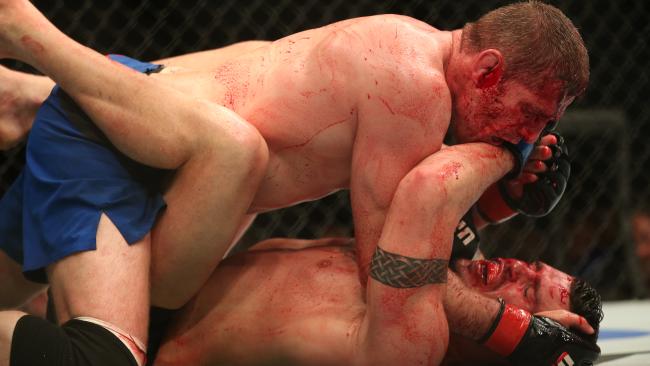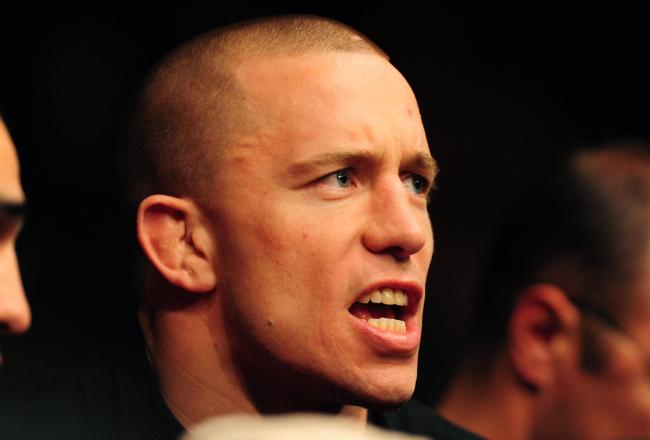This Saturday night at UFC 209 we have two fighters in the Octagon who are on opposite sides of streaks. On one side you have “Suga” Rashad Evans; a former light heavyweight champion and TUF heavyweight champion, Evans has fallen on tough times recently, as medical issues and injuries have kept him out of the cage. And when he has actually been able to fight, the results have been less than stellar, as Evans has turned in very uneven performances, including two embarrassingly one-sided recent losses in a row. Evans has dropped down to the middleweight division in hopes of jumpstarting his career, and turning himself into an elite and hopefully championship fighter once again.
On the other side we have the subject of this article, the streaking Daniel Kelly. The former TUF Nations participant is the owner of a 5-1 record in the Octagon, on top of winning his last three fights in increasingly impressive fashion. In a notoriously thin division, any series of wins can get you talked about as a contender, and a name fight can cement you as an active participant in title talks. Today we discuss the surprising turn in Kelly’s career, as he has gone from TUF also-ran to legitimate middleweight competitor; we will also discuss what Saturday night means to his career moving forward.
Daniel Kelly has gained momentum in the UFC the old-fashioned way, by winning fights. The three-time Olympian didn’t come in with any fanfare, being a fighter in his late thirties who had a history of injuries and who had come into the UFC off a one-sided loss to TUF Nations runner-up Sheldon Westcott. There wasn’t much consideration of Kelly’s future, because it didn’t seem like he had much of one in front of him. Three years and six fights later, Kelly is in the midst of a three-fight win streak and is on the cusp of establishing himself as legitimate middleweight contender; even in a division as historically thin as middleweight has been, this is quite an accomplishment.
The confounding thing about Kelly is that his wins don’t line up to his biggest and most dominant skill set, which would be his judo (grappling). Unlike a Ronda Rousey or Karo Parisyan, Kelly’s fight footage in the UFC isn’t littered with examples of high-level athleticism, various high-amplitude throws, and lightning-quick submission finishes. That isn’t the kind of fight style we have seen from Kelly, as he hasn’t been nearly as aesthetically pleasing as the two other most accomplished judoka in the UFC. Instead we have seen a fighter who has won fights through a combination of many factors: durability, deliberate pressure, veteran savvy, physicality, and aggressive counter punching on the feet; a punishing clinch game mixed with various trips and throws; and an exhaustingly suffocating top game.
The effectiveness of Daniel Kelly’s game isn’t in the myriad of techniques, high-level concepts, or athleticism; its effectiveness is found in the simplicity and directness of his fight style. Kelly applies a steady pressure that puts his opponents under duress, forcing them to move more than normally, which limits their ability to get off offensively while cutting into their energy reserves. This pressure also makes his opponents more likely to throw high volume, high power strikes to dissuade Kelly from pressing them; this is what creates the opportunity for him to establish his counterstriking-oriented game. Favoring his right hook and straight left, the southpaw pushes his opponents backwards and forces them into clinches where he goes to work alternating between attacking with short strikes to the head and body. and mixing in takedown attempts.
The takedown attempts serve a dual purpose: One, it extends the grappling exchange, forcing opponents to burn energy defending them while limiting their ability to counter with their own offense. Also, the takedown attempts actually get Kelly to the position where the large majority of his fights take place. As a result of his ability to score takedowns — as well as defend and counter them via his hips, balance, and timing coming from his extensive judo background — he is able to control or beat up opponents. This approach has been the route to victory in his early wins (Steve Montgomery, Patrick Walsh) and in his two most impressive and recent wins (Antonio Carlos Jr. and Chris Camozzi).
As impressive and unlikely as Daniel Kelly’s streak has been, there has been a dark lining to go with this silver cloud: the level of opposition. Kelly hasn’t crushed anyone he has faced — he has beaten them, come back on them, physically dominated them, but he hasn’t walked through anyone. The guys he has faced are third- or fourth-tier at best, and he has struggled with each and every one of them. This is why he has a 5-1 record and isn’t mentioned as a potential contender — because the guys he has beaten haven’t done anything noteworthy in the Octagon in regards to quality of fighters beaten or quantity of fights won. And as many positives as he shown, as mentioned earlier, he has shown just as many negatives, ranging from suspect cardio, a lack of defensive responsibility, an inability to consistently initiate offense, and inconsistent athleticism. All of these things can and will be tested repeatedly as he moves forward into the meatier part of the middleweight division.
Even guys who aren’t truly elite have the physical and technical skills to take advantage of each and every one of Kelly’s limitations, and unlike the majority of his opponents so far, these guys won’t just put him in bad spots, they will finish him when they do. This isn’t hard to believe, because of the one blemish on an otherwise stellar record in the Octagon: the first time Kelly faced a guy who was beyond that third/fourth-tier of opposition, he was beaten decisively by Sam Alvey via first-round knockout, which drives home the point even more so.
“Suga” Rashad Evans, the former TUF heavyweight winner and former UFC Light Heavyweight Champion, has fallen on hard times, only winning two out of his last six fights, and currently riding a two-fight losing streak. This is in tandem with extensive bouts of inactivity due to injuries and other medical circumstances. Upon first look, you could look to these things, as well as Evans’ drop to middleweight, as a reason to feel that he is merely a showcase for Kelly, who has a burgeoning fan base and a streak of wins behind him. But when you look at the names Rashad has lost to, things don’t look quite as simple. Jon Jones, Glover Teixeira, Ryan Bader, Antonio Rogerio Nogueira; one pound-for-pound champion, one title challenger, and two top-fifteen-ranked light heavyweights. These guys possess balanced skill sets, experience, athleticism, conditioning, and durability, things that none of the guys Kelly has beaten possessed. On top of that, while Evans has declined, he is still one of the most durable, athletic, and experienced guys in the UFC’s light heavyweight or middleweight divisions, and Kelly hasn’t faced anything close to what Evans is bringing to the table.
Used to dealing with guys a division above, most of which have extensive wrestling and grappling backgrounds to go with huge size advantages; Rashad Evans was rarely bullied or controlled, meaning that an ability to control pace and place of the fight through physicality and tenured grappling will not exist for Kelly. And of more concern is Evans’ mobility on the feet, counter-heavy style, fast hands, and punching power, as these things take full advantage of a slow-footed, defensively irresponsible, and technically limited striker. Even coming off of two losses and moving to a new division, “Suga” is for all intents and purposes the most dangerous opponent Kelly has ever faced.
If Daniel Kelly wins Saturday night, we have a legitimate contender in the division, as he will have beaten the most accomplished and talented opponent he has faced, as well as having beaten one of the biggest names in the organization. Due to Evans’ poor performances prior to this fight, a win won’t be as impactful as it could be, but it still would provide him with a name win, which can catapult him into a legitimate ranking in the division, which will lead to bigger and better fights. For Rashad Evans, this is the type of fight he can’t afford to lose if he still wants to be considered a guy with the potential to be elite or compete for a world title; regardless of how many wins Kelly has had, his age and level of opposition haven’t established him as one of the best in the division, or even a known quantity regarding where he fits in at middleweight. UFC 209 is a pivotal fight for both men: one trying to prove he is real, and the other trying to prove he still is.

UFC 209: Woodley vs. Thompson 2 takes place March 4, 2017 at T-Mobile Arena in Las Vegas, Nevada.
Click the stars to rate how good you think UFC 209 will be.
**********







